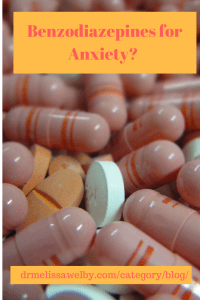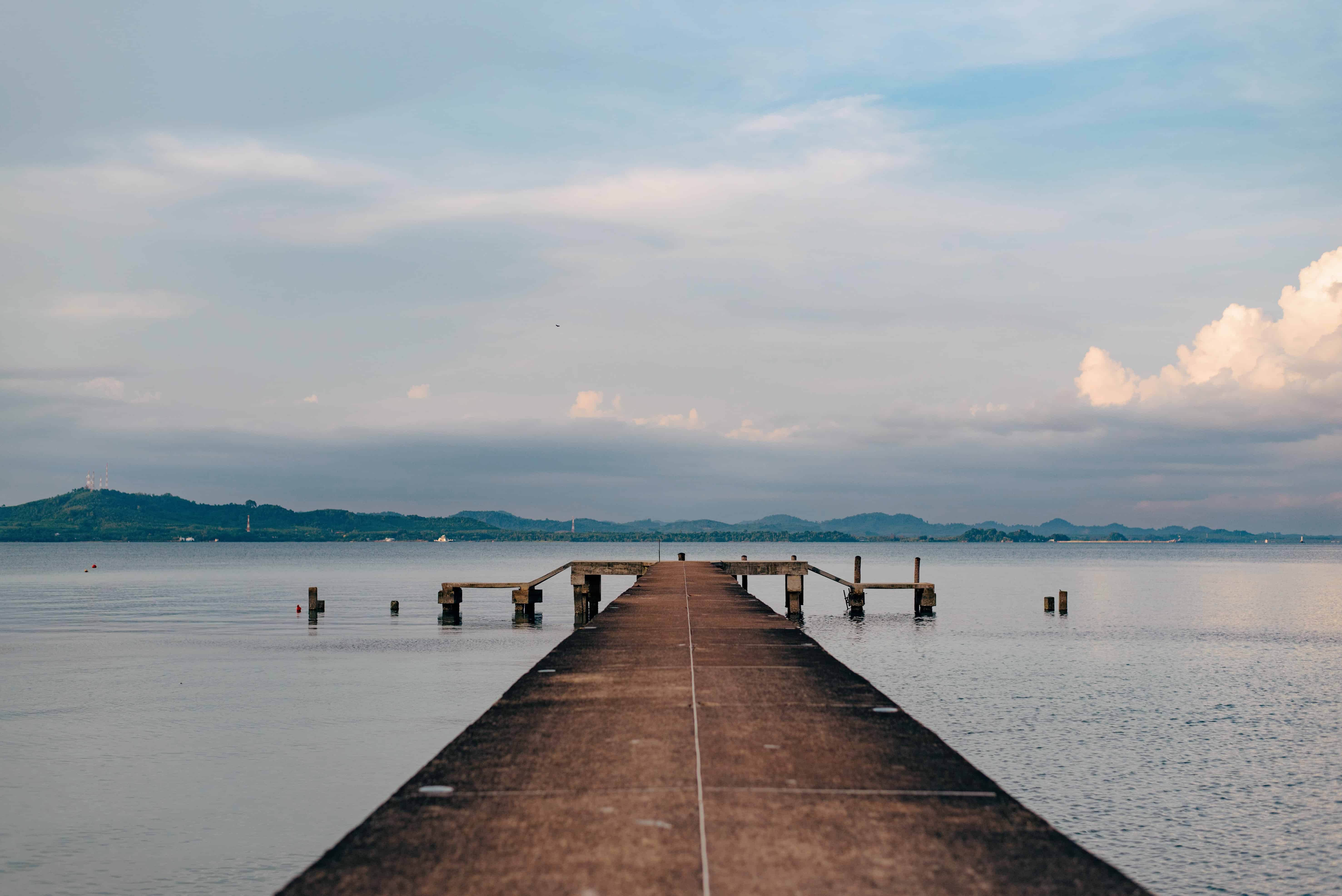Are Benzodiazepines a Treatment for Anxiety? A quick fix or a long-term problem? They are frequently used but there are potential side effects of benzodiazepines and, even worse, risk of dangerous benzodiazepine withdrawal. Learn more about when it may be reasonable to use a benzodiazepine for anxiety treatment and what the risks are.
What benzodiazepines are used for anxiety treatment?
There are several different medications in the benzodiazepine family of medicine. Some common ones are Xanax/alprazolam, Klonopin/clonazepam, Ativan/lorazepam, and Valium/diazepam. Any of one of these can be used as a treatment for anxiety.
These medicines differ in how long they take to have an effect and how long the effect lasts in your body. Xanax is short acting. It works quickly going in and out of your system so it can be helpful for a panic attack. Klonopin, on the other hand, lasts longer so can be more useful for people that have ongoing anxiety.
Here is a chart showing the relative strength of each benzodiazepine:
Benzodiazepines as Treatments for Anxiety
First the good news: Benzodiazepines can help as a treatment for anxiety
They can help! For anxiety, benzodiazepines can be helpful for short-term and as-needed relief of symptoms. Benzodiazepines work quickly and can ease anxiety symptoms temporarily. For people with a specific phobia (like fear of flying) they can be useful as an adjunct to skills learned in cognitive-behavioral therapy (although ideally, you won’t need medication once you learn skills!).
Benzodiazepines can also be helpful while waiting for an antidepressant to kick in. Antidepressants generally start to work 3-5 weeks from when you are at a therapeutic dose. This can feel like a lifetime for someone who is suffering from anxiety. In addition, some antidepressants can have an initial side effect of making people feel jittery. This is not pleasant for anyone but especially if you are already anxious! Benzodiazepines can be helpful for this temporary side effect.
Now the bad news: There are potential side effects of benzodiazepines and dangerous withdrawal
YES, YOU CAN DIE FROM BENZODIAZEPINES!
Some people wonder why I want to take them off their benzodiazepine when they feel it is helping. Unfortunately, benzodiazepines aren’t good as a long-term cure for anxiety. They can produce dependency and a growing tolerance to the effects of the medicine (where larger doses are needed to get the same effect).
Here is a great blog post on the history of benzodiazepines and concerns about their long-term effects.
Benzodiazepine withdrawal:
With regular use, benzodiazepines need to be tapered. Dangerous withdrawal symptoms can happen if they are stopped abruptly (similar to what happens when people go into alcohol withdrawal). Many other unpleasant withdrawal symptoms including insomnia and rebound anxiety can happen once dependent.
In addition to physical dependence, there is always a concern for psychological dependence and addiction. Here is additional information on benzodiazepine withdrawal.
Treatment for anxiety:
There are many different approaches to treating anxiety and some of the most effective treatments aren’t medicine (cognitive-behavioral therapy is one). Benzodiazepines can be helpful for short-term management of anxiety in the right person but are not generally a great long-term solution. They work well as a band-aid but not as a cure!
I have written several posts that talk about ways to overcome anxiety:
Do what you are afraid of! Stop letting anxiety control you
Although this series was geared towards overcoming depression, people with anxiety will also benefit. Exercise is a treatment for depression but also benefits anxiety. These posts will be helpful to get started:
Treating Depression with Exercise
Exercise and Depression: How to get started when you want to stay in bed
3 Tips for Exercise: How to stay motivated when depressed
Tapering off benzo’s:
If you are on a benzodiazepine and want to taper off make sure you do this with the help of a medical professional. The time it takes to get off of benzodiazepines will depend on how high your dose is. Let your doctor help you taper off in a safe way to minimize your withdrawal and come up with a treatment plan for your underlying anxiety.
I recommend the following books to learn more about anxiety and how to take control of it. There are additional resources (like great apps!) to target anxiety listed on my resources page and in my bookstore.
[amazon_link asins=’1626252157,1400097665,0804139806,1591473144,1608822087,1462520421′ template=’ProductCarousel’ store=’drmelissawelb-20′ marketplace=’US’ link_id=’ef66455c-9393-43af-9271-af90283c459b’]
This post contains affiliate links to Amazon. Dr. Melissa Welby is a participant in the Amazon Services LLC Associates Program, an affiliate advertising program designed to provide a means for sites to earn advertising fees by advertising and linking to amazon.com. Amazon offers a small commission on products sold through their affiliate links. The prices you pay through these links are the same as you would pay going to Amazon directly. Your purchases via the Amazon affiliation links help support the upkeep and maintenance of this blog.
Any product I recommend on this site I would use myself or recommend to a family member!






Hi there, thanks for the great article. I have a question I’m hoping you might be
able to answer. I was wondering, What is the difference between anxiety disorder
and paranoia. I have bad fits of paranoia sometimes and I’m thinking
I might look into anxiety medication. I would appreciate any insight you can provide.
What paranoia means depends on the definition a person is using. ie some people with anxiety feel “paranoid” but they mean that to be a word for worried or fearful to do something because of their anxiety. Psychotic paranoia is very different and not a reality-based worry. Psychotic paranoia may make someone feel anxious and fearful but the content of the thoughts is very different. Example: Thinking the government has installed monitoring devices all over your house in order to study you is not generally reality-based for the average person vs being fearful of your house being broken into is reality-based (ie it could happen even if it isn’t likely). It’s complicated to explain! It can be helpful to go speak to a psychiatrist and they can help you sort out what is happening and how to help it.
Great article!
So many people come into the ER asking for benzodiazepines. our answer:usually no, because these aren’t benign medications and need to be monitored by a professional. Thank you for giving people the downsides and showing they aren’t a quick a fix…
Very informative and helpful! Thank you for the great information
Really nice post thanks for sharing
Can someone with anxiety overcome benzos?
I had some anxiety after an incident and they gave it to me in the hospital. I took it for sleep for a week. Suddenly I was waking up in the morning with with heart palpitations and dizziness.
Then I was told to start an SSRI but to keep taking the Ativan to help with the anxiety. I take a very small dose .25 at bedtime and .5 in the morning: but it’s been 5 months now.
Wondering if there is any hope of combating anxiety now and not using them?
Absolutely it can be done! Benzo’s can be a short-term bandaid for an acute or an occasional event but they ideally aren’t the treatment. Having a conversation with your psychiatrist about the plan to treat your anxiety is important. Sometimes benzos are used while waiting for the SSRI to be helpful and then tapered off. This is a great question!